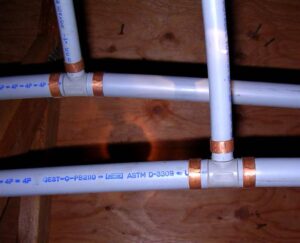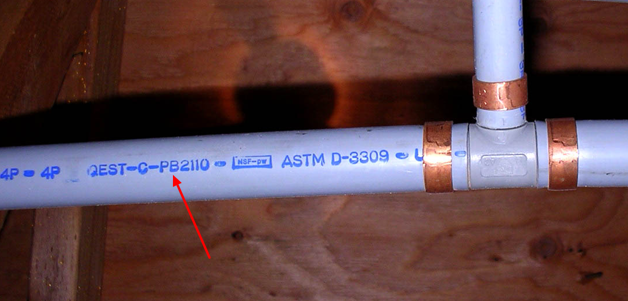Top 7 Questions About Polybutylene Piping in Florida Answered

Polybutylene piping used to be a popular piping option because it’s flexible, easy to install, and resistant to corrosion. However, after years of use, it became apparent that this material has a number of flaws, some of which could lead to premature pipe failures and costly water damage.
Many homes in Florida installed polybutylene piping while it was still on the market, so there are homes out there that still use this material. If you are concerned that you may have polybutylene pipes in your home, this article from the expert plumbers at Aztec Plumbing & Drains can help. We will answer some of the most common questions you may have about the piping and discuss your piping replacement options.
1. What Is Polybutylene Piping?
Polybutylene piping is a type of plastic pipe that was used from about 1978 to 1995. It looks similar to modern PEX pipping, with a flexible pipe that is crimped onto fittings like elbows using metal rings. The piping was quite popular because compared to its more traditional alternatives like galvanized steel and copper, polybutylene had several advantages:
- It was flexible for easy routing throughout the home
- It was easy to install, with no tedious threading or soldering required
- It was resistant to rust and corrosion, unlike metal pipes
- It was less likely to fail if the pipe froze
Despite these advantages, polybutylene pipes eventually started to pose enough problems that they are no longer manufactured or allowed by U.S. building codes.
2. Why Are Polybutylene Pipes No Longer Used in Homes?
After polybutylene had been used for many years, it began failing quite regularly. The product proved vulnerable to the chlorine and chloramine disinfectants that were used to eliminate viruses, bacteria, and other pathogens in the municipal water supply. Exposure to these chemicals would gradually degrade the pipe until it became weak enough to burst.
Failed polybutylene piping caused millions of dollars in damages to homes throughout the United States. Its use was discontinued after a class-action lawsuit was filed against Shell Oil in 1995, one of the leading manufacturers of polybutylene piping, in which it was claimed that polybutylene pipes could easily rupture and cause damage to homes. Since this suit, polybutylene pipes are no longer acceptable by U.S. building codes and all manufacturers stopped production.
3. How Do I Know if I Have Polybutylene Pipes?

Polybutylene is a flexible plastic pipe that looks similar to PEX, so it can be hard to tell the difference. It ranges from half an inch to 1 inch in size, and it is usually gray in color, though it can be silver, white, black, or blue.
The best way to identify polybutylene is by the lettering on the pipes. The piping will often have lettering along its length, identifying the manufacturer, as well as the pipe type and size. There were three major manufacturers: Shell Chemical Company, Quest, and Vanguard. Quest piping, for instance, was often stamped “Quest” and “PB2110.”
Most polybutylene piping will be hidden behind walls, but it may be visible where it is exposed to connect to sinks, toilets, water heaters, the water meter, or the main water line from the city.
4. What Should I Do if My House Has Polybutylene Pipes?
Polybutylene pipes typically fail within 10 to 15 years, so if you spot any in your home, it is important to have them replaced by a professional plumber as soon as possible. Since the polybutylene piping was discontinued in the mid-1990s, any pipes that are still installed pose a serious risk of failure and water damage, as well as mold growth. Plus, any damage that is done by polybutylene piping is no longer covered by most insurance companies, so it’s important to have it replaced before any problems occur.
If you have just a few polybutylene pipes, individual replacements may be possible, but if most of your piping is polybutylene, a whole-home repiping will be the most reliable long-term solution.
5. What Does Repiping Polybutylene Pipes Involve?
When you call a professional plumbing company to repipe your home, they will:
- Shut off your main water supply
- Cut access points into the walls to reach the polybutylene pipe
- Remove all the old polybutylene pipe and fittings
- Install new high-quality piping, such as PEX
- Test the system for leaks and proper pressure
- Repair any damage caused by accessing the pipes
6. How Long Does Repiping a Home Take?
It will depend on the size of the home and the layout of the pipes. Many homes can be repiped within one to two days, followed by a few more days of work to repair the drywall and repaint the affected areas. Larger homes may take a week or longer.
7. Can I Stay in My Home While It’s Being Repiped?
Yes, you can stay in the home while it’s being repiped, though the water will be shut off during the day while the plumbers are working. The plumbers can work on one bathroom at a time, so that at night, you will have access to at least one bathroom. It may be more convenient, however, to stay at a hotel or make other arrangements while the new pipes are installed.
Choose Aztec for Whole-Home Repiping in Fort Myers
If you suspect that you have polybutylene piping in your Florida home, don’t risk water damage and structural problems. Call our team at Aztec Plumbing & Drains for whole-home repiping services. We will work quickly to make the process as convenient as possible for your family, without compromising on quality, and we offer excellent financing options to make it easier on your budget. Our company has been serving homeowners in Fort Myers, Cape Coral, Naples, and the surrounding areas since 1991, and we feature top-rated customer service, upfront pricing, free estimates, and valuable coupons and discounts.
Call Aztec 239-932-2959 today to request your free repiping estimate in the Fort Myers area.
Learn More in Our Repiping Series:
-
- The Process of Repiping Your Home
- What to Do When Pipes are Clogged
- Why Do My Pipes Keep Clogging?
- How to Unclog Cast Iron Pipes
- How to Stop Your Knocking Pipes
- How Long do Plumbing Pipes Last?
- How to Keep Pipes From Freezing in Winter?
- Should I Buy a House with Polybutylene Piping?
- How to Replace Quest Piping?
- Should You Replace Copper Piping?
- Pipe Maintenance 101
Contact Us
Contact Us
"*" indicates required fields


